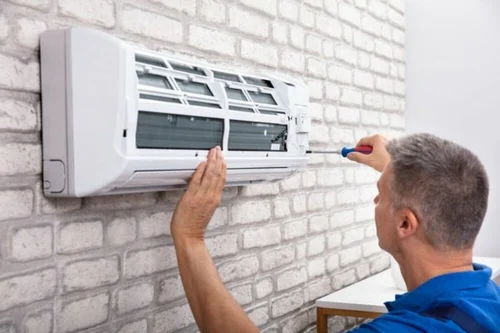Air Conditioning Repair Euless TX Understanding the relationship between humidity and air conditioning is essential for optimizing cooling operations and maintaining comfortable indoor environments.

In this comprehensive guide, we’ll explore the impact of humidity on air conditioning effectiveness in detail:
1. Humidity and Indoor Comfort:
- Humidity refers to the amount of moisture present in the air. High humidity levels can make indoor spaces feel warmer and more uncomfortable, even at lower temperatures, due to reduced evaporation of sweat from the skin.
- Air conditioning systems help remove excess moisture from indoor air through the process of condensation, which occurs when warm, humid air comes into contact with cold surfaces such as evaporator coils.
- By reducing humidity levels, air conditioning systems enhance indoor comfort by promoting evaporative cooling and preventing feelings of stickiness or clamminess associated with high humidity.
2. Cooling Capacity and Efficiency:
- Humidity affects the cooling capacity and efficiency of air conditioning systems. When indoor air contains high levels of moisture, air conditioners must work harder to remove heat and humidity, leading to increased energy consumption and reduced cooling efficiency.
- Air conditioners use refrigerant to absorb heat from indoor air and transfer it outdoors. When humidity levels are high, air conditioners must remove both sensible heat (temperature) and latent heat (moisture), which can strain the system and reduce its cooling capacity.
- In humid climates, air conditioning systems may struggle to maintain desired indoor temperatures, especially during periods of high outdoor humidity, resulting in reduced overall cooling effectiveness and comfort.
3. Dehumidification Process:
- Air conditioning systems dehumidify indoor air as part of the cooling process. When warm, humid air passes over the evaporator coils of the air conditioner, moisture in the air condenses into liquid water, which is then drained away.
- The dehumidification process helps maintain comfortable humidity levels indoors and prevents excessive moisture buildup, which can lead to mold growth, musty odors, and indoor air quality issues.
- In areas with consistently high humidity, standalone dehumidifiers may be used in conjunction with air conditioning systems to supplement moisture removal and enhance indoor comfort.
4. Setpoint Temperature and Humidity Control:
- Many modern air conditioning systems offer options for controlling both temperature and humidity levels to optimize indoor comfort and energy efficiency.
- Programmable thermostats and advanced HVAC controls allow users to set desired temperature and humidity levels independently, enabling precise control over indoor climate conditions.
- By maintaining relative humidity levels between 30% and 50%, air conditioning systems can achieve optimal comfort while minimizing energy consumption and operating costs.
5. Condensate Management:
- Proper condensate management is essential for maintaining air conditioning effectiveness and preventing moisture-related issues. Excess condensate must be drained away efficiently to avoid indoor flooding, water damage, and microbial growth.
- Air conditioning systems are equipped with condensate drainage mechanisms, such as drain pans, drip lines, and condensate pumps, to remove liquid water generated during the dehumidification process.
- Regular inspection and maintenance of condensate drainage components are necessary to ensure proper operation and prevent clogs or blockages that could impede system performance.
6. Considerations for Humid Climates:
- In humid climates, air conditioning systems may require additional capacity and specialized features to effectively manage moisture and maintain indoor comfort.
- High-efficiency air filters, dehumidification modes, variable-speed compressors, and enhanced airflow controls are among the features commonly found in air conditioners designed for humid environments.
- Proper sizing, installation, and maintenance of air conditioning systems are crucial for optimizing performance and efficiency in humid climates and mitigating the adverse effects of high humidity on indoor comfort and air quality.
Conclusion:
- Air Conditioning Repair Euless TX Whether in humid or dry environments, managing humidity levels is key to achieving optimal indoor comfort and energy efficiency with air conditioning.
Veterans AC & Heating
615 N Main St #155, Euless, TX 76039, United States
1-817-858-9301
https://maps.app.goo.gl/cWJMg6XZJTvqStuB8